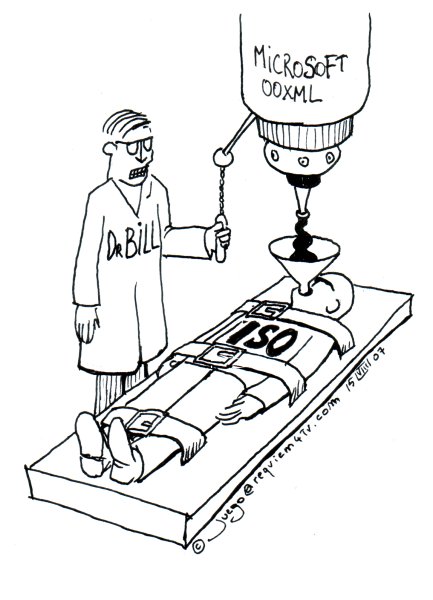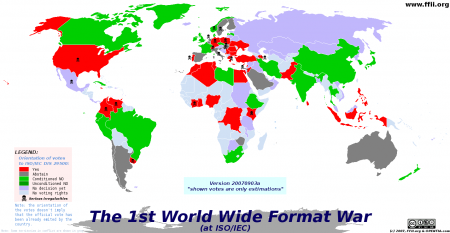I’m sure most of the techies out there already know about the effort of Microsoft to push their XML-based file format “Office Open XML” (OOXML in short) of the Office 2007 Suite as open standard. The problem with it is though, that the whole format description is way too bloated (more than 7000 pages; ODF not even has 1000), doesn’t honor other, existing ISO standards (f.e. date and time formats in ISO 8601) and is spicked with references to proprietary attributes like “useWord97LineBreakRules” or “autoSpaceLikeWord95”.
To make a long story short, if people were enthusiastic in first place on Microsoft’s step towards an open, XML-based format, away from the proprietary binary format they used earlier versions, this enthusiasm soon ebbed away when it became obvious that the whole action is just window-dressing. In its current state, OOXML will not allow any third-party software developer to fully support the format, because of all the undefined holes in it. Rob Weir, a software architect from IBM, gives a good insight of what this format is actually about in his personal blog, if you like to read on.
Now since ISO standardization seems to be a global process where every country must cast a vote, it seems that Microsoft has done a good job lobbying for their format in many of them (f.e. Australia, which is said to vote positive), while having a hard time in others: Yesterday was announced, that Microsoft failed to get the needed 9 votes in the USA, which is a very good signal. The deadline, however, is September 2nd, 2007. Until then, a lot of stuff can happen. There is a petition going on on noooxml.org, which has been signed by more than 33.000 people already. I’d strongly encourage you to sign that as well, and, if you get the chance, write your local ISO standards body to vote against OOXML in your country. For Germany this is the “Deutsches Institut für Normung” , in short DIN, which seems to review the format since May this year already.
Lets see where Germany and the other, yet undecided countries, are heading. Its already a farce that OOXML made it through ECMA and is now a standard after ECMA-376 (though the process leading to this is highly debatable).
However, what disappoints me the most as of now is, that Apple voted “Yes” in the aforementioned US ballot. I was always thinking, Job’s company is a bit smarter than the rest and not just follow the leader, but I guess business considerations were more important in this particular case. If Apple looses Microsoft as developer on the Mac, they loose the Mac Office Suite and also one important selling factor in business environments: Compatibility with Microsoft Office.
Pussies. They could do better. And they partially did better already, by launching the new iWork ’08 with Office Open XML support now, before Office for Mac 2008 arrives in January next year – now if they’d just include ODF support as well…
EDIT 2007-08-22: It seems that the German standards body voted PRO Office OpenXML (German source) – imho a very sad day. I hope the other countries will not follow Microsofts approach equally blind.

